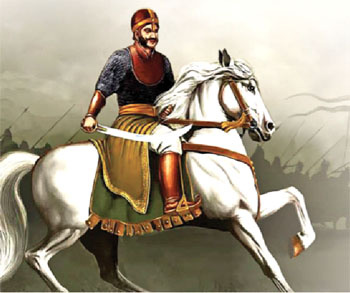
Maharaja Chhatrasal was a medieval Indian ruler from the Bundela Rajput clan, who fought against the Mughal Emperor Aurangzeb and established his own kingdom in Bundelkhand, becoming the founder of Panna State.
This Bundeli warrior’s father had raised the banner for freedom a generation earlier but was killed in battle with the Mughals after killing the favourite of the emperor, Abu Fazl. He was born in Kachar Kachnai on May 4, 1649, to Champat Rai and Lal Kunwar. Chhatrasal raised the banner of revolt against the Mughals in Bundelkhand at the age of 22, with an army of 5 horsemen and 25 swordsmen, in 1671. During the first ten years of his revolt, he conquered a large tract of land between Chitrakoot and Panna on the East and Gwalior on the West. His domains stretched from Kalpi in the North to Sagar, Garah Kota and Damoh in the South. Some of the Mughal generals who he defeated were Rohilla Khan, Kaliq, Munawwar Khan, Sadruddin, Sheikh Anwar, Sayyid Latif, Bahlol Khan and Abdus Ahmed.
Mahamati Prannathji was Chhatrasal’s Guru, and he took Nijanand Sampraday, also known as Pranami Sampraday, as his Guru. Their meeting occurred in Mau, a town near Panna, in 1683. His nephew Dev Karanji made this meeting possible, who had already seen Swami Prannathji in Ramnagar.
Maharaja Chhatrasal waged a non-stop war against the Mughals and earned great respect for his independent spirit. Following the death of Aurangzeb, the Maratha raids began to rock and ultimately shattered the Mughal Empire
Prannathji inspired Chhatrasal so much that he became his disciple. When Maharaja Chhatrasal arrived to see him, he was preparing to fight the Mughals. Swami Prannathji presented him with his own sword and a shawl, stating, “You’ll always come out on top. Your territory will have diamond mines, and you will rise to become a powerful ruler.” His prophecy came true, and the Panna region is still known for its diamonds. Swami Prannathji was not only the religious Guru of Chhatrasal, but he guided him too in political, social, and economic matters. By being granted the boon of finding diamonds in Panna by Swami Prannathji, On the other hand, the inhabitants of Bundelkhand refused to pay the ‘Jizyah’ levy or Islamic toll tax and continued to raise their heads and fight for freedom. Wave after wave of Mughal and Pathan attacks were driven back over the land, resulting in a bloody conflict that lasted over fifty years. Each succeeding invasion resulted in the devastation of Hindu temples and the massacre of unarmed populations, as well as the rape of women and the enslavement of kidnapped women and children. This only heightened Bundela’s determination to struggle for freedom and retribution. The Mughals enforced the ‘Jizyah’ levy, or Islamic poll tax, on Hindus. As a symbol of the Bundelas’ scorn for Mughal’s fanaticism, the Maulvis who came to collect Jizyah in Orchha, the capital of Bundelkhand, had their decapitated heads sent back to the Emperor with pages of the Koran stuffed in them. In 1684, the Emperor conducted a massive expedition to Bundelkhand to crush the ‘idol worshippers’ but was forced to retire without accomplishing any lasting achievements, leaving trails of misery and ruin but failing to defeat Chhatrasal and the Bundelas.
Shivaji was already the most celebrated and heroic Hindu figure of his times, who had faced the Mughals on equal terms and whose exploits and achievements, courage and idealism had won him respect throughout India. Chhatrasal offered to serve Shivaji in the latter’s war against Aurangzeb. But Shivaji suggested to him to open hostilities against Aurangzeb in Bundelkhand, where he would gain many adherents. “Illustrious Chief! Conquer and subdue your foes. Recover and rule your native land …” Shivaji advised him.
In the second phase of his struggle between 1681 and 1707, Chhatrasal suffered a few reverses. Due to Aurangzeb focusing his main military efforts on extending his domain into the Deccan, Chhatrasal did not have to face the full military might of the Mughal Empire.
Maharaja Chhatrasal captured Mahoba in 1680. In the years to come, Chhatrasal waged a non-stop war against the Mughals in Bundelkhand, earned great respect and renown for his independent spirit, sense of honour, and love for his land and freedom, and finally carved out an independent State with its capital at Panna. Following the death of Aurangzeb, the Maratha raids began to rock and ultimately shatter the Mughal empire, and the Bundelas progressively gained territory over their Muslim enemies. The best Mughal generals were dispatched one after another to conquer the Bundelas, but all of their operations failed. Eventually, in a last desperate attempt, the famous Pathan warrior Muhammad Khan Bhangash was sent with his fighters in 1730 and engaged in a final struggle. The now aged Chatrasal with his sons and warriors drew the Pathans into battle, and with the help of the Maratha Peshwa Baji Rao, they won a final victory over the Mughals in 1730, expelling them finally from their lands.
When his eventful 81 years long life ended, the Mughal rule from Bundelkhand had been wiped off.














